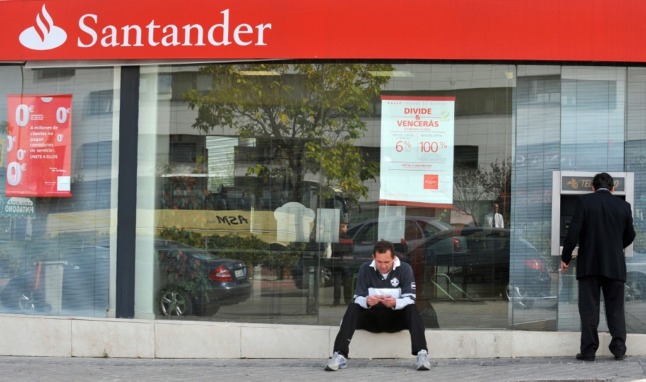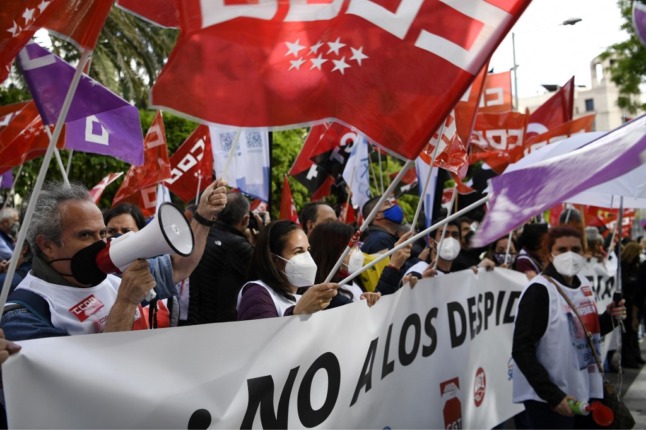Life in Spain is pretty fantastic, right? First there's all that sun, then you've the friendly people and the cheap food and drink. But even in paradise, there is always going to be that occasional, unbelievably frustrating Only in Spain moment.
When that happens, where else to go but Twitter? And whether it's late nights, loud neighbours, or the difficulty they face in finding their favourite foods, it turns out Spain's guiris (foreigners) have found plenty to grumble about.
Here's The Local's compilation of complaints about Spain on Twitter.
One of the hardest things to get used to in Spain as a foreigner is time-keeping and the Spanish habit of always arriving at late.
You know you live in a rift in the spacetime continuum when “now” legitimately means “within the next hour or so” #spainproblems
— Cole Morrison (@yeahsooooooo) December 1, 2015
Woe betide you if you actually turn up on time:
Showed up half an hour late to this birthday party, here before the owners of the house. #SpanishProblems
— Yojan Santes (@yojansantes) January 2, 2016
Some guiris manage to get the hang of it.
Today I was an hour and a half late meeting a friend, I think I’ve lived here too long #spainproblems
— Hannah Colder (@HannahColder) May 6, 2018
Timing is also hard to deal with when it comes to mealtimes and the nocturnal nature of the Spanish.
When it's 11:24pm and you are just sitting down at the table to eat dinner #Spainproblems
— Emily Barry (@emily_barry10) November 20, 2015
Yesterday I went for dinner and came home at 6am #spainproblems
— Hannah Colder (@HannahColder) March 18, 2017

And when it comes to getting things done, especially bureaucracy, don't look to Spain for efficiency.
Average time it would take for a task to be completed in Canada: 1 hr. In Spain: 7 days #frusterated #spainproblems
— Paula Barcante (@paulabarcante) March 17, 2015
Then there's the language problems.
Spanish problems:
1: I’m going to pay the internet
Voy a pagar el internet
2: I’m going to turn off the internet
Voy a pagar el internet
-_- it’s the same damn thing in Spanish #spanishproblems #spanishvocabulary
— Alex Castañeda (@Ac_Doce) July 29, 2019
Oh what a difference an 'ñ' makes!
AÑO and ANO are two very different things. #spanishproblems
— Stephanie Millán ✨ (@millan_steph) January 1, 2015
Attempting to say the word 'comb' in Spanish is a task not to be taken lightly…
Peine = Comb
Pene = Penis#spanishproblems— Faye Shepherd (@Faye_Shepherd) March 31, 2017
And what happens when you get so used to saying things the Spanish way that your friends back home think you're really strange.
And then you get made fun of for pronouncing Wi-Fi as wee-fee back in America #Spainproblems
— Ellen W (@E_Wat89) July 28, 2014
Getting the hang of the local customs can be tricky too.
The issue with siestas is then you have to convince yourself to get out of bed for the *second* time that day #Spainproblems
— Sk(Ely)ton (@themaplesslane) March 28, 2017
And what is it with those light switches??!
Is it the hall light or is it a doorbell? Welcome to Spanish roulette #SpainProblems #SorryNeighbor
— Emma (@ekobz) December 4, 2016
Nothing like having to do the wave every five seconds while peeing because the bathroom light timer keeps going off #Spainproblems
— Sk(Ely)ton (@themaplesslane) April 13, 2017
Let us know on Twitter (@thelocalspain) any particular #spainproblems of your own.
READ MORE: Seven habits you will never be able to truly master like a Spaniard





 Please whitelist us to continue reading.
Please whitelist us to continue reading.
Lol! So true 🙂 Can’t wait to return!!
My first here in Spain was full of enthusiasm for learning the language and embracing the community. Four months later Christmas arrived. I gladly went around the local town wishing everyone ‘feliz navidad y ano neuvo’. Yes I had missed the subtly of the n in ano which is something completely different. I was impervious to the laughter and persistence of my new neighbours repeatedly repeating the expression correctly. There was much merriment and no one was offended. For the uninitiated ano means ar*ehole. After finding out my error I spent the first week visiting all of my haunts repeating my greeting correctly, to much amusement of the towns folk. Bless them all.
I now have hearing aids
Kris (Montroy, Valencia)
In Australia we switch lights on in a down direction and of course off is in the up direction On=down off=up.
In Spain one turns the “lights up” and then turns the “lights down”. My theory is that started with lanterns where one turns the wick up or down.
And then there’s the inevitable pushing the door into the cafe and going nowhere because it ‘s meant to be pulled. It’s like fighting my way in and out all the time. Add that to the realization that I’m either losing my fingerprints or just downrite inept since it takes me so long to open those plastic bags needed to contain and weight your produce.
As one who’s been living in Spain for 18+ months, I’m still caught off guard when someone says ‘Buenos dias’ around 5 pm … yes, at 17 hrs. at least twice I’ve heard it … la siesta is what it’s always been …a slice of Spanish culture but ‘Buenos dias a las 5’?